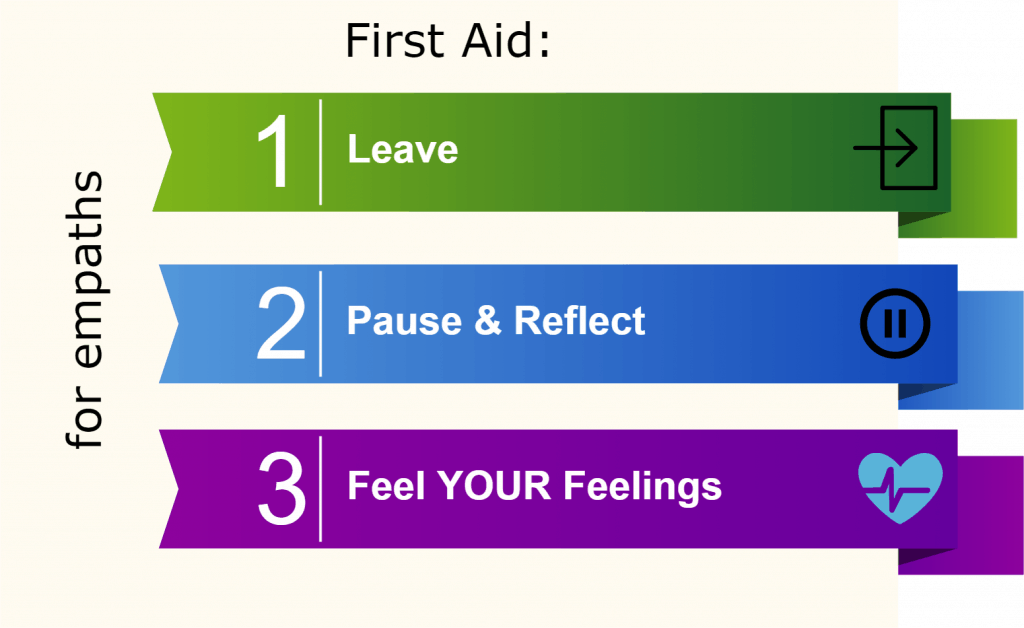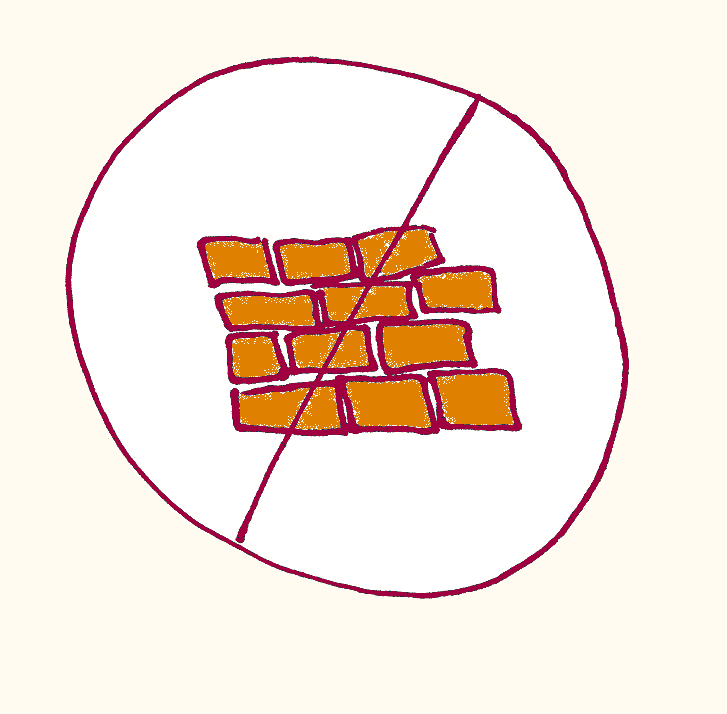I’ve read a lot of empath-advice on shielding and closing yourself off from the world. But that way, you further entrench the deeper trauma that “the world is not a safe place” instead of “a loving place”.
That way you are encouraged to lock yourself into your own pain.
Worse, when you “harden” yourself on the outside, to “block out” uncomfortable sensations, you also block your inner SatNav.
How we come to be empaths is a whole separate story, but suffice it to say that, while it turned into an automatic way of being when we were little, we can choose to consciously reprogramme that way of being.
That work is no joke, as it really is about pulling up and changing many of our inner foundational assumptions about how to live. And while it is very worth it (just take a look at the many testimonials here), it’s not something I can teach you in a blog post. (Instead, I have a whole in-depth course on it)
What I can do in this article is share 3 simple yet impactful shifts you can start making in how you choose to respond to currently emotionally overwhelming and spongy situations.
1. Should I stay or Should I go…
Use your sensitivity to check whether someone or someplace feels good/safe. It’s better to get out of a bad place than stay there and drown in negativity.
I also propose leaving over frantically trying to “block” things. That is, when you’re grown up, you have that new possibility of leaving at your disposal. At least, most of the time. It’s the ultimate form of self-care.
Rule of thumb:

Of course, leaving can also turn into isolating. If isolation is your go-to, then it really is time to prioritise getting serious, down to earth training. Isolation teaches you nothing about how to handle energy. While it can be great to recharge – knowing that you are forced to hide does not create real peace of mind.
2. Noticing Automatic Empath-Reactions
Every empath is different. We all have different triggers that get us to just “soak it all up and carry it around”. When you start to notice when you do this, you can start to choose a different response. This doesn’t “heal” your sponging, but it can soften it. At the very least, you start to notice which dynamics are playing themselves out and where you are on auto-pilot.
Back in the day when I still sponged a lot of energy (yeah, I don’t anymore!), I worked on noticing when (and why!) my automatic empath-reactions would kick in. To illustrate, here are some of the responses I identified:
- I would lose myself in someone else/their problems in order to distract myself from my own needs. (“Maybe I should take care of myself first”)
- I played the clown or tried to cheer people up in order to improve a suffocating atmosphere. (“Maybe I can stop trying so hard”)
- I forgot that everyone needs to make their own empowering decisions and so I would get swept up in someone else’s victimhood. (“Maybe it’s not my job to save them”)
Realizing what I did, when I did it, and why I did it opened up new choices every single time. It brought me back to the space in me from where I had power and choice in that moment.
It doesn’t fix all the energy overwhelm (by far), but it’s an empowering first step that gives you more breathing room.
(For more support with taking and practicing that first step, purchase my Energy Sensitivity Starter Kit here It’s a small yet effective prequel to the full empath training programme.)

3. The Role of Your Own Emotions
Being an empath is not all about energy from others. Your own pain also acts as a magnet.
Your deepest sadness acts as a magnet for the sadness of others. When you heal your own sadness, the magnetic pull of that particular emotion lessens. You’ll notice that sad people don’t freakishly seek you out (as much) anymore.
Here’s the thing, sometimes people seek you out because they figured out they can dump it all on you. Other times, their pain is a mirror for your own. This is a very different dynamic from empath sponging, but it impacts empaths just the same (because this kind of mirroring affects all people, including empaths).
So, that’s why another powerful step in lessening the impact of others’ energies is to process your own pain.
Of course, the trouble for empaths is, how do you know it really is yours in the first place?
Well, the reality is, as long as you don’t have the training to know what is what, you often won’t know. (And if you’re not sure whose it is, it’s better not to analyze and try to process it, because you could be piling things onto your plate that aren’t even yours).
Nevertheless, if you know you’ve been going through something tough and you know you’ve been stuffing those feelings away, making time to feel your feelings is really important.

The Goal: Conscious Clairsentience
Being an empath is not your natural state. It’s something you learned how to do. You can in fact unlearn it. When you do, what you are left with is your natural clairsentience. That’s your ability to feel energy from others, minus the tendency to absorb it. I know that may not sound like much of a difference when what you are feeling now is so much suffering and pain, but the difference is huge.
Imagine it like this. You know those static white little balls they put in bean bags? They’re impossible to get off your hands, or the carpet, or anything. If you ever opened up a beanbag and let those things out, you probably regretted it. That’s what empath sponging is like. You get anywhere near those things and they are all over you and you can’t shake them off.
Now imagine those little balls are less small and are made of paper. They are small wads of paper and you can just sweep them away. Yes, they are still there. Yes, you still see them. But they don’t stick. They’re not static. You no longer feel panicky and out of control trying to deal with them. They’re just little pieces of paper, no big deal.
When we struggle with something, we imagine that the best solution would be for the whole thing to just disappear. Like homework. Or a scary job interview. Or a big presentation. But when we’re skilled, the interview is not so scary, the homework kind of interesting and the presentation makes us proud.
What makes being an empath such a crazy-making experience is that the sponging has gotten to such a level that it’s happening all the time and it’s constantly flooding your system with stressful emotional energy from others. It’s sticky and static and everywhere and you can’t get it to stop by trying to make it stop. That’s scary.
And that’s exactly why learning how it happens, why it happens, and how to remove the auto-sponging makes all the difference. When you learn how to remove the static, everything gets 10x easier to deal with.
It’s worth working towards!
Note: for more guidance on how to stop sponging, be sure to check out the empath course: “From Suffering Sponge to Sensitive Savant“. It teaches all the things mentioned in this post (and much more!) to give you the needed tools and understanding to stop sponging energy (for good!) without shutting down, closing your heart, or being a martyr.





















{ 2 comments }
I live in London UK, where can I find more help here please x
Hi Melanie,
When I work with people, I do so over skype, so location is not an issue.
Comments on this entry are closed.